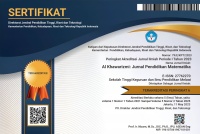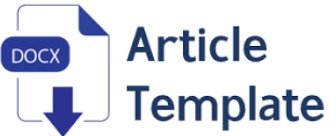KEMAMPUAN PEMAHAMAN KONSEP MAHASISWA PADA MATERI FUNGSI PEMBANGKIT
DOI:
https://doi.org/10.46368/kjpm.v3i2.1355Abstract
Abstrak: Penelitian ini bertujuan untuk mengetahui kemampuan pemahaman konsep mahasiswa pada materi fungsi pembangkit. Penelitian ini merupakan penelitian kualitatif dengan metode deskriptif. Subyek penelitian ini adalah mahasiswa angkatan pertama prodi Tadris Matematika IAIN Pontiank berjumlah 21 orang. Hasil penelitian pemahaman konsep mahasiswa terkait konsep fungsi pemangkit biasa dan eksponensial yaitu mahasiswa mampu memberikan contoh dan bukan contoh, namun kemampuan menyatakan ulang sebuah konsep masih kurang, kemampuan mengklasifikasikan objek menurut sifat-sifat tertentu sesuai dengan konsepnya dipahami dengan baik. Kemampuan menyajikan konsep dalam berbagai bentuk representasi matematis belum dapat ditunjukkan mahasiswa dan kemampuan mengembangkan syarat perlu atau syarat cukup dari suatu konsep juga masih terdapat beberapa kekeliruan pada bentuk bentuk lain. Namun, mahasiswa memiliki kemampuan menggunakan, memanfaatkan dan memilih prosedur tertentu serta kemampuan mengaplikasikan konsep ke pemecahan masalah. Jika diamati dari indikator yang di pahami, maka mahasiswa termasuk memahami dengan pemahaman instrumental terhadap fungsi pemangkit biasa dan eksponensial karena sudah mampu memberikan contoh dan bukan contoh, menggunakan dan menyelesaikan permasalahan namun belum dapat menyatakan ulang suatu konsep secara matematis.
Kata Kunci: Pemahaman Konsep, Fungsi Pembangkit
Abstract: This study aims to determine the ability of students to understand the concept of generating function material. This research is a qualitative research with descriptive method. The subjects of this study were 21 students of the first batch of Mathematics Tadris study program at IAIN Pontiank. The results of research on students' understanding of concepts related to the concept of ordinary and exponential generating functions, namely students are able to provide examples and non-examples, but the ability to restate a concept is still lacking, the ability to classify objects according to certain properties in accordance with the concept is well understood. The ability to present concepts in various forms of mathematical representation has not yet been shown by students and the ability to develop necessary or sufficient requirements for a concept also has some errors in other forms. However, students have the ability to use, utilize and select certain procedures as well as the ability to apply concepts to problem solving. If observed from the indicators that are understood, students also understand with an instrumental understanding of ordinary and exponential generating functions because they are able to provide examples and non-examples, use and solve problems but have not been able to restate a concept mathematically.
Keywords: Concept Understanding, Generating Function
References
Basri, Y.M. (2017). Deskripsi Pemahaman Konsep Fungsi. Jurnal Nalar Pendidikan. 5(2). 93-102
Hendrakus, dkk. (2022).Pemahaman Konsep Siswa Pada Materi Teorema Pythagoras. Jurnal Pendidikan Matematika (AL KHAWARIZMI), 2 (1). 29-36.
Susanto, A. (2015). Teori belajar dan pembelajaran di sekolah dasar. Jakarta, Indonesia: Prenadamedia Group.
Yanti. W.A. dkk (2022). Pemahaman Konsep Siswa Dalam Menyelesaikan Masalah Matematika Pada Materi Fungsi Kuadrat Menurut Teori Kilpatrick Must: Journal Of Mathematics Education, Science And Technology. 7(1). 30-49
Downloads
Published
How to Cite
Issue
Section
Citation Check
License
Authors who publish with this journal agree to the following terms:
1. Authors retain copyright and grant the journal right of first publication with the work simultaneously licensed under a Creative Commons Attribution License that allows others to share the work with an acknowledgement of the work's authorship and initial publication in this journal.
2. Authors are able to enter into separate, additional contractual arrangements for the non-exclusive distribution of the journal's published version of the work (e.g., post it to an institutional repository or publish it in a book), with an acknowledgement of its initial publication in this journal.
3. Authors are permitted and encouraged to post their work online (e.g., in institutional repositories or on their website) prior to and during the submission process, as it can lead to productive exchanges, as well as earlier and greater citation of published work.






